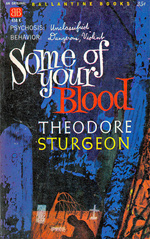
![]() charlesdee
charlesdee
10/9/2011
![]()
Theodore Sturgeon wrote some of the best and most formally inventive sf of its day. But remember, Sturgeon's Law states,"90% of everything is crap." This book is by no means crap, but it has a couple of stylistic choices that put it pretty far down on the Sturgeon list as far as I'm concerned.
Letters between doctors, transcripts of psychiatric sessions, journal entries -- these are Sturgeon's nod to Bram Stoker's epistolary construction of Dracula. And it all works well except for a long, narrative section that is supposed to be the patient, George, writing his life story in the third person. George turns out to be an excellent writer, a natural storyteller, and Sturgeon requests an enormous willing suspension of disbelief on the reader's part if we are to find this conceivably the work of the character. The exposition is necessary, and maybe there was really no other way to handle, but George is quite the stylist. What works much better is the psychiatrist's ability to take his story, detect the gaps and lies in it, and pull those from George using hypnosis, that tried and true technique certainly practiced more and with better success in fiction that anywhere else.
George drinks blood. I don't think that's a spoiler given the book's title and references to vampires all over the back cover. Further details, on the other hand, are genuinely creepy and convincing as pathology. George is not well. He is glad that his doctor is going to fix him up, but I doubt that he will be leaving the institution anytime soon. Or I would hope not.
Some of Your Blood is a quick read that effectively presents some really disgusting material in such clinical format that some of it takes a moment to sink in. George is a kind of innocent, but one that you would want to keep locked up for life.
Sturgeon's other stylistic blunder is a prologue and epilogue in which he addresses the reader and frames the novel in what sounds like one of Boris Karloff's commentaries on Thriller, It's beneath him, or maybe i'm pretending that the novel doesn't have the pulpy origins it does.
http://www.potatoweather.blogspot.com